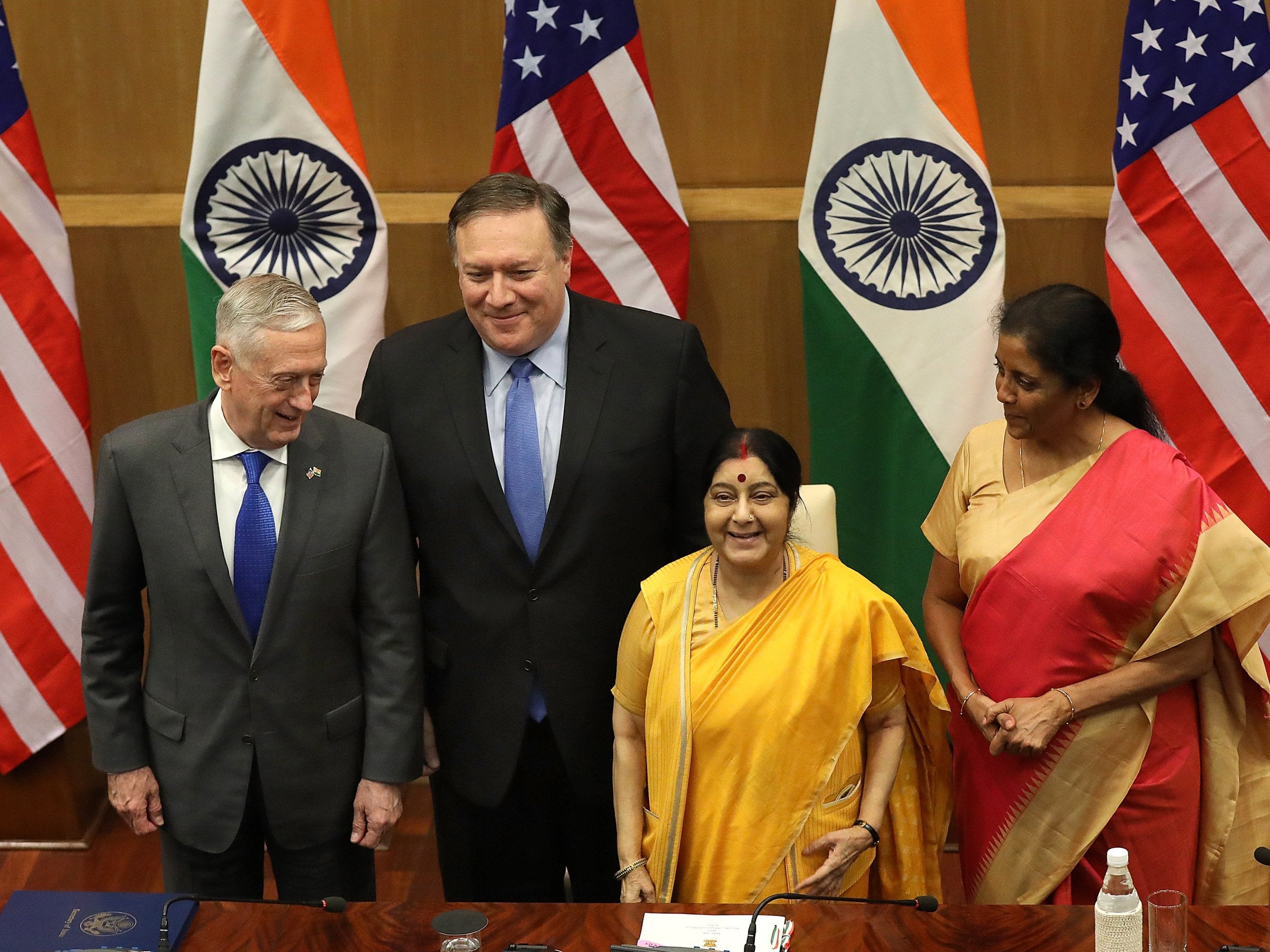US and India sign 'breakthrough' military agreement despite differences over Iran and Russia
US-Indian defence cooperation 'elevated to unprecedented heights' by surprise outcome

The US and India signed a military cooperation deal on Thursday that has been more than a decade in the making, an unexpected and substantial development that American officials hailed as a breakthrough but which raised questions about what India was getting in return.
The deal will see India joint a select group of fewer than 30 countries that have agreed to align their military communications systems with America’s.
Nirmala Sitharaman, India’s defence minister, said the deal “elevated India-US relations to unprecedented heights”. General Mattis said the breakthrough made their alliance “one of the most consequential in the region and in the world”.
The US has been pushing for the Communications Compatibility and Security Agreement (Comcasa) for many years, saying it will allow American manufacturers to sell high-tech equipment such as armed surveillance drones into the Indian market.
India has previously said it wants such drones to monitor Chinese activity in the Indian Ocean - but baulked at the idea of potentially opening up its communications network to the US military.
For its part, India hailed an agreement from the US to begin negotiations on another deal that would allow Indian defence manufacturers to bid for projects building weapons with sophisticated US technology.
That would be a big step for Narendra Modi’s “Make in India” policy, which seeks international investment to strengthen the country’s manufacturing sector.
In other developments, the two countries also agreed to open a hotline between their foreign ministries and hold joint exercises - the first involving all three military branches in the air force, navy and the army - off the eastern Indian coast in 2019.
Gopalan Balachandran, distinguished fellow at the Delhi-based Institute for Defence Studies and Analyses, told The Independent: “Comcasa has been on the table for at least the last 10 years, so this is a significant breakthrough - at least as far as the United States is concerned.
“How far it is significant for India remains to be seen. They have secured a memorandum of understanding only. We still don’t know what made the Indian government decide this was now a good deal, after holding out for so many years.”
One factor may have been the way Donald Trump has ramped up diplomatic pressure on India's main regional rivals, Pakistan and China - earning him plenty of goodwill in Delhi in the process.
Mr Pompeo held a meeting in Islamabad on Wednesday with Pakistan's new prime minister, Imran Khan, hours after it was revealed that the US had cut $300m in aid payments to Pakistan over its alleged failure to combat militant groups.
“India supports President Trump’s South Asia policy,” said India’s foreign minister, Sushma Swaraj. In her opening remarks on Thursday. “[Trump’s] call for Pakistan to stop its policy of supporting cross-border terrorism finds resonance with us.”
At the same time, the Comcasa deal will also give the US a good excuse to look the other way over India’s efforts to buy an S-400 air defence system from Russia, which would violate US sanctions against Moscow.
Asked about that deal, which had been framed as a major sticking point ahead of the 2+2 summit, Mr Mattis told reporters on his way to India: “Freedom means that at times nations don't agree with each other. That doesn't mean we can't be partners. That doesn't mean we don't respect the sovereignty of those nations.”
India is also seeking some flexibility from the US on its Iran sanctions. Delhi has been holding productive trade talks with Tehran in recent months, particularly on oil purchases, even as President Trump has insisted that any country working with Iran will have no business from the US.
Ahead of the Delhi talks, a senior US State Department official told the Reuters news agency the US was engaged in "very detailed conversations" with India over the Iran issue.
"We're asking all of our partners, not just India, to reduce to zero oil imports from Iran, and so I'm confident that will be part of our conversation with India," the official said.
Join our commenting forum
Join thought-provoking conversations, follow other Independent readers and see their replies
Comments
Bookmark popover
Removed from bookmarks